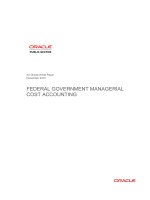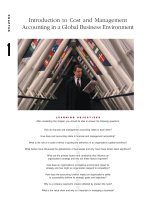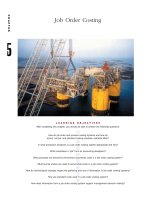Cost Analysis Managerial and Cost Accounting
Bạn đang xem bản rút gọn của tài liệu. Xem và tải ngay bản đầy đủ của tài liệu tại đây (3.31 MB, 36 trang )
Larry M. Walther; Christopher J. Skousen
Cost Analysis
Managerial and Cost Accounting
Download free books at
Download free eBooks at bookboon.com
2
Larry M. Walther
Cost Analysis
Managerial and Cost Accounting
Download free eBooks at bookboon.com
3
Cost Analysis: Managerial and Cost Accounting
1
st
edition
© 2010 Larry M. Walther, under nonexclusive license to Christopher J. Skousen and
bookboon.com. All material in this publication is copyrighted, and the exclusive property
of Larry M. Walther or his licensors (all rights reserved).
ISBN 978-87-7681-586-8
Download free eBooks at bookboon.com
Click on the ad to read more
Cost Analysis:
Managerial and Cost Accounting
4
Contents
Contents
Cost-Volume-Prot and Business Scalability 6
1 Cost Behavior 7
1.1 e Nature of Costs 7
1.2 Variable Costs 7
1.3 Fixed Costs 9
1.4 Business Implications of the Fixed Cost Structure 10
1.5 Economies of Sale 10
1.6 Dialing in Your Business Model 12
2 Cost Behavior Analysis 14
2.1 Mixed Costs 15
2.2 High-Low Method 16
2.3 Method of Least Squares 17
2.4 Recap 20
www.sylvania.com
We do not reinvent
the wheel we reinvent
light.
Fascinating lighting offers an infinite spectrum of
possibilities: Innovative technologies and new
markets provide both opportunities and challenges.
An environment in which your expertise is in high
demand. Enjoy the supportive working atmosphere
within our global group and benefit from international
career paths. Implement sustainable ideas in close
cooperation with other specialists and contribute to
influencing our future. Come and join us in reinventing
light every day.
Light is OSRAM
Download free eBooks at bookboon.com
Click on the ad to read more
Cost Analysis:
Managerial and Cost Accounting
5
Contents
3 Break-Even and Target Income 21
3.1 Contribution Margin 21
3.2 Contribution Margin: Aggregated, per Unit, or Ratio? 21
3.3 Graphic Presentation 23
3.4 Break-Even Calculations 23
3.5 Target Income Calculations 24
3.6 Critical inking About CVP 26
4 Sensitivity Analysis 27
4.1 Changing Fixed Costs 27
4.2 Changing Variable Costs 27
4.3 Blended Cost Shis 29
4.4 Per Unit Revenue Shis 29
4.5 Margin Beware 31
4.6 Margin Mathematics 32
5 CVP for Multiple Products 33
5.1 Multiple Products, Selling Costs, and Margin Management 35
6 Assumptions of CVP 36
360°
thinking
.
© Deloitte & Touche LLP and affiliated entities.
Discover the truth at www.deloitte.ca/careers
Download free eBooks at bookboon.com
Cost Analysis:
Managerial and Cost Accounting
6
Cost-Volume-Prot and Business Scalability
Cost-Volume-Prot and Business
Scalability
Your goals for this “cost-volume-prot analysis” chapter are to learn about:
• Cost behavior patterns and implications for managing business growth.
• Methods of cost behavior analysis.
• Break-even and target income analysis
• Cost and prot sensitivity analysis.
• Cost-volume-prot analysis for multiproduct scenarios.
• Critical assumptions of cost-volume-prot modeling.
Download free eBooks at bookboon.com
Cost Analysis:
Managerial and Cost Accounting
7
Cost Behavior
1 Cost Behavior
“Protability is just around the corner.” is is a common expression in the business world; you may
have heard or said this yourself. But, the reality is that many businesses don’t make it! Business is tough,
prots are illusive, and competition has a habit of moving into areas where prots are available. And,
sometimes, business owners become frustrated because revenue growth only seems to bring on waves
of additional expenses, even to the point of going backwards.
How does one realistically assess the viability of a business? is is perhaps the most critical business
assessment a manager must make. Most of us are taught from an early age to do our best and not give
up, even in the face of adversity. And, there are countless stories of businesses that struggled to survive
their infancy, but went on to become highly successful rms. But, it is equally important to note that
some business models will not work. You likely have heard the tongue-in-cheek story about the car
dealer who said he loses money on every sale but makes it up on volume. Of course, the math just won’t
work. A good manager must learn to use information to make informed decisions about which business
prospects to pursue. Managerial accounting methods provide techniques for evaluating the viability
and ability to grow or “scale” a business. ese techniques are called cost-volume-prot analysis (CVP).
1.1 The Nature of Costs
Before one can begin to understand how a business is going to perform over time and with shis in
volume, it is imperative to rst consider the cost structure of the business. is requires drilling down
into the specic types of costs that are to be incurred and trying to understand their unique attributes.
1.2 Variable Costs
Variable costs will vary in direct proportion to changes in the level of an activity. For example, direct
material, direct labor, sales commissions, fuel cost for a trucking company, and so on, may be expected
to increase with each additional unit of output.
Assume that GoSound produces portable digital music players. Each unit produced requires a
printed circuit board (PCB) that costs $11. Below is a spreadsheet that reveals rising PCB costs with
increases in unit production. For example, $1,650,000 is spent when 150,000 units are produced
(150,000 × $11 = $1,650,000). e data are plotted on the graphs. e top graph reveals that total
variable cost increases in a linear fashion as total production rises. e slope of the line is constant. Of
course, when plotted on a “per unit” basis (the bottom graph), the variable cost is constant at $11 per
unit. Increases in volume do not change the per unit cost. In summary, every additional unit produced
brings another incremental unit of variable cost.









